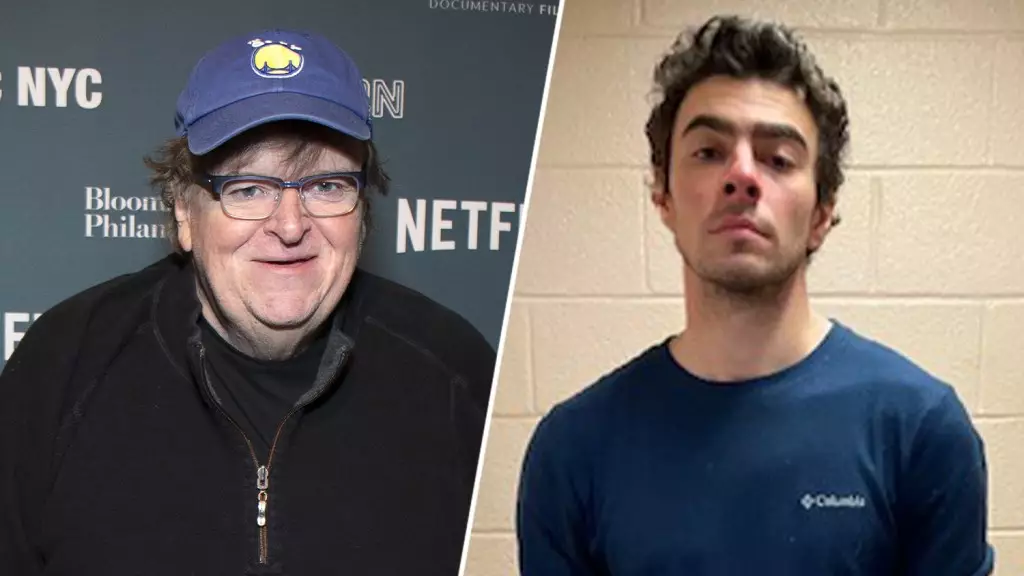In the wake of the tragic death of UnitedHealthcare CEO Brian Thompson, the landscape of public discourse around healthcare has erupted with newfound intensity. The arrest of Luigi Mangione, a suspect in Thompson’s murder, has catalyzed a wave of media scrutiny and public reflection. Renowned filmmaker Michael Moore has emerged as a critical voice in this dialogue. Through an open letter addressing Mangione’s manifesto, it becomes apparent that this incident transcends the mere act of violence; it is part of a broader narrative that critiques the deeply entrenched issues within the American healthcare system. The emotional response to Thompson’s killing serves as both a wake-up call and a reflection of the growing frustration many feel in the face of systemic injustices caused by profit-driven healthcare practices.
In his letter, Moore does not shy away from expressing solidarity with those who are angry with the healthcare industry. He articulates a sentiment that resonates with many Americans: the indignation directed toward billion-dollar insurance companies represents a culmination of years of neglect, financial burdens, and suffering imposed on ordinary citizens. The intense emotion surrounding Thompson’s death is not merely a random outburst; rather, it underscores the pent-up frustrations rooted in the painful realities of healthcare in America. Moore argues that this anger is “1000% justified,” and he positions himself clearly against attempts to suppress this rage. By declaring that he wants to “pour gasoline on that anger,” Moore reframes the conversation away from individual acts of violence toward an examination of systemic failures.
Moore’s commentary emphasizes that the outrage is not solely about the violent act against a CEO, but rather about the broader suffering inflicted by the healthcare industry on countless individuals. He references “mass death and misery,” highlighting how the American system has spawned a cycle of denial and neglect that claims lives unjustly. The filmmaker’s insistence that no one should die due to a lack of health insurance speaks to the fundamental human right to access adequate healthcare. This situation paints a bleak picture of an industry more concerned with profit than the wellbeing of its clients, evidenced by the relentless cycle of denials and overwhelming medical debt experienced by many.
Moore is quick to clarify that while he empathizes with the anger directed toward the healthcare system, he does not condone Mangione’s actions. By labeling the murder as “rich on rich crime,” he emphasizes the profound disconnect often characteristic of societal elites. Mangione, from a wealthy background, exemplifies the troubling relationship between privilege and violent reactions to systemic injustice. This juxtaposition highlights the complexity of the narrative unfolding in the aftermath of Thompson’s death—an individual tragedy occurring within the larger tapestry of America’s healthcare crisis.
Ultimately, Moore’s letter is both a condemnation of violence and a rallying cry for advocacy against a flawed system. He maintains that the anger prevalent in the wake of this tragedy should not be ignored; rather, it should be leveraged to ignite discussion and action regarding healthcare reform. By including a link to his documentary, “Sicko,” Moore seeks to educate and mobilize public opinion on healthcare issues further. His perspective underscores an urgent need for systemic change and holds up a mirror to society, encouraging a shift in focus from individual tragedies to the collective call for justice in healthcare.
As the nation grapples with the aftermath of Thompson’s death and the revelations surrounding it, it is crucial for society to channel the fiery emotions into constructive dialogue about reforming the healthcare system. Moore’s critical analysis invites all stakeholders—politicians, healthcare providers, and the general public—to confront the harsh realities of the current landscape. The call for change is not just about addressing one tragic event but rather an opportunity to dismantle the barriers that prevent equitable access to healthcare, ensuring that no one else suffers needlessly as a result of systemic failures.

Leave a Reply